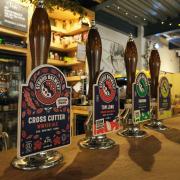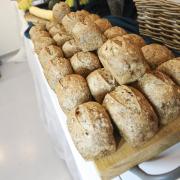For a small independent restaurant, a table not turning up for their booking can wipe out the night’s profits. Mark Taylor looks at this increasing problem and how it might be tackled

It has become one of the biggest problems in the restaurant industry but the number of customers not turning up for bookings is still rising, at huge cost to independent businesses.
The total cost of ‘no shows’ is hard to calculate but one survey put the annual figure for British restaurants at a staggering £16bn.
Ask restaurateurs and chefs for reasons why more and more people are not turning up for bookings and opinions vary.
Apart from plain rudeness and bad manners, the common consensus is that some diners are so keen to secure tables in some of the region’s best restaurants that they book multiple restaurants for the same lunch or dinner. They hedge their bets and pick and choose where to go on the day, depending on their mood.
Quite why so many people don’t bother to turn up for a meal they have booked is fairly unique in the world of retail and hospitality. After all, not many people would fail to attend an expensive concert or major sports event after paying for tickets months in advance.
Although the lost revenue for a restaurant can soon take its toll, especially on a small independent business, trying to tackle the problem of no-shows isn’t easy.

The main preventative measure - and one that many Michelin-starred establishments have introduced - is to ask people for their credit card details when they book. If those diners fail to turn up on the day, the restaurant charges them a percentage of the total cost.
It’s a controversial step in an industry based on hospitality but it’s also strange that people object to such measures despite being happy to pay a deposit for large group bookings or special occasions such as Christmas meals.
Bob Parkinson of Made By Bob in Cirencester only takes bookings for special event evenings, but he says that even then his restaurant still gets ‘no shows’.
“It is frustrating because they don’t realise they are costing the restaurant so much money. You can’t resell that table at such late notice and by then you have already catered for them, both in terms of staff and preparing the food during the day. I have considered taking deposits but you don’t want to sound mistrusting in a service industry.”
Cheltenham restaurant The White Spoon gets no shows on a regular basis and chef/owner Chris White says it’s getting worse.
“We get no shows every week and it normally happens during dinner service on the weekend - our busiest time, when we have a waiting list for tables.

“A couple of months ago we had a table of eight not show. We had confirmed with them over the phone the day before, and they received a reminder email on the morning of their Saturday booking.
“On the occasions that people don’t show up, we call them and sometimes it is an honest mistake or there is an acceptable reason. Unfortunately, a lot of the time they don’t answer and it’s obvious they have missed their reservation intentionally.”
Chris says the impact on a small restaurant is substantial. If a large table doesn’t honour a booking, it can often be the difference between profit and loss that day.
“I think it has always been an issue but only now have people started to talk about the impact it has on establishments, especially independents.
“With margins increasingly tightening in the industry, the financial impact of no shows is increasing. How to combat it is a growing discussion.
“It can be extremely damaging. For example a table of eight is 20% of our restaurant capacity and 20% loss in potential turnover.

“We have considered bringing in the credit card charge that restaurants have introduced elsewhere but it’s not the norm in Cheltenham and we do worry it would discourage customers from booking with us.
“We were publicly criticised for taking credit card details to secure a reservation, and this was during Race Week. However, I think if one establishment took this step the rest would soon follow and it would quickly become the norm.”
For Gareth Fulford, chef/owner of Purslane, the problem of no-shows has resulted in the Cheltenham restaurant taking bank card details for weekend evenings, event nights and Race Week.
“The card details are stored offsite on a secure server and only charged if we aren’t able to recoup lost revenue by reselling the table.
“The fee for a no-show is the equivalent of three courses from our a la carte menu. We’ve had that in place for 12 months and only had to charge one party so far. We still get no shows on weekdays and at lunchtimes but just have to take those on the chin.
“It encourages customers to take their booking seriously and to have the courtesy to let us know if they can’t make it when sometimes they might dismiss it as trivial or unnecessary.

“Before we started taking card details, we were getting regular no shows, often with big tables. We had a table of 10 not turn up during Race Week once, which was frustrating as we had turned away so many customers and lost a third of that night’s revenue in one hit. We definitely learned from that experience.
“We only have 12 tables and a maximum of 34 covers so even a table of two not showing up is at least 6% of revenue lost. It may not seem a lot but when you’re a small independent restaurant working to a very tight budget it’s a massive hit. Big chains can swallow the cost a little more but we’re a much tighter ship and it causes a big dent.”
Having seen the problem of no-shows become more and more of an issue, The Olive Tree restaurant at Bath’s Queensberry Hotel implemented a number of procedures at the start of 2016. In doing so, the restaurant has all but eradicated the problem.
The hotel’s owner, Laurence Beere, says the new policy means all reservations must be made with a valid credit card number and reservations not cancelled 48 hours in advance are liable to a £50 per person charge.
Credit card details are entered into an independent company system called Stripe. The Olive Tree does not hold the card details and once taken and input, the restaurant can’t get access to them.
When charging a guest, the payment amount is put into Stripe and the payment is taken by them. The funds are then paid to the restaurant minus a handling charge.
“We began using the system in March and since then we have felt it necessary to charge 32 guests for no shows, which amounts to a total of around £1600.
“In reality, where we can resell a table we do not charge and if a guest has a genuine reason, we do not charge.
“We try to maintain a positive relationship with our guests, but since we implemented this system, we no longer see no shows week in week out as we did before.”
Andrew Scott is executive chef at the four-star Sudbury House hotel in Faringdon, Oxfordshire, where he oversees the exclusive Restaurant 56 and also the hotel’s larger brasserie.
With tasting menus at the eight table Restaurant 56 ranging from £55 to £70 per person, plus optional wine flights, the average spend can be around £100 per person once you’ve added pre-meal drinks and extras. If people fail to honour their booking, that can amount to a hefty loss for a restaurant already working to tight margins.
“If we have 16 booked and a table of four cancels, that’s a quarter of the bookings,” says Andrew, who has appeared on BBC2’s Great British Menu.
“We had a table of ten fail to turn up for a special event, which cost £65 a head, so we lost £650 that night, and that’s not including the wine they would have bought on top of it.
“We phoned them and they simply said ‘oh, sorry, we forgot’. The worst thing about it was we had a waiting list of people who were desperate for tables but it was too late to resell it.
“People just seem to think it’s acceptable to do it but they don’t appreciate what it does to morale in the kitchen of a small restaurant.
“We are not a corporate restaurant chain where some of the food might be frozen or produced in a central kitchen - we prepare the food depending on the numbers we have in the diary.
“We make the canapés that day for the number of people who have booked and we roll the bread in the morning depending on how many covers we have. We prepare enough food for that day so if a table cancels, some food inevitably ends up in the bin or used for the staff lunches.”
Andrew says he hasn’t started to take people’s credit card details yet, mainly because he doesn’t want to offend the diners.
“We’ve got three AA rosettes, which is a great accolade, but until you have that magical Michelin star or you have four or five rosettes, people aren’t interested in giving you their credit card details.
“I ate at a three Michelin star restaurant recently and had to give my credit card details. They emailed to say if you don’t give us so many hours’ notice, we will charge you £100 per person.
“The irony was that our train to London was delayed and we only just got there in time for the meal. There was a horrible moment when I thought I would be charged £400 for the table and not even have lunch!”
Read more from Mark Taylor, take a look at his investigation of the thorny issue of the restaurant discretionary charge
Do you think you should be charged for not showing up to your table? Or as a restaurant owner have you been affected by no-shows? Tweet us @cotswoldlife



























